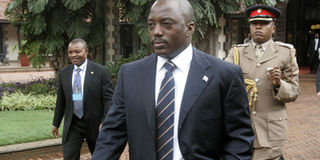Why Kabila may soon be powerless

Democratic Republic of Congo's President Joseph Kabila Photo/REUTERS
What you need to know:
Ignoring Parliament in deal with Rwanda cause of President's woes, says reporter
Congolese President Joseph Kabila is slowly moving towards a crisis whose climax could be his removal from power, says a journalist who just fled the east of the country.
Mr Claude Gilbert Kamba says that there is a political crisis in the Congo, caused by President Kabila’s decision to sign a peace agreement with Rwanda without the consent of Parliament and other organisations such as the UN, that were involved in this process before.
National army
Under the deal, the Rwanda army was allowed to send troops into Congo and the National Congress for People’s Defence (CNDP) group, formerly led by General Laurent Nkunda, declared that it will no longer fight the Congo government and that it will train the national army and the police in the east of the country.
The signing of the deal mid last month saw major spade-work by Rwanda, a process that led to Kigali’s breaking off from its traditional ally, Nkunda and backing his rival, Jean Bosco Ntaganda.
The initial plan was to sign the agreement in Nairobi where talks were being held under the chairmanship of former Nigerian President Olusegun Obasanjo.
Gen Nkunda was later arrested by the Rwanda Government but Kigali has refused to hand him over to Kinshasa.
Says Mr Kamba: “Nkunda is under arrest because he was not listening to Rwandan advice, especially after he refused to allow Rwandan troops to enter Congo, saying that if they had to come in, they had to be under his command.’’
Mr Kamba adds that Ntaganda is just carrying out Rwanda’s interest, not Congolese, and Kigali will finally hand him over to the International Criminal Court in the Hague, where he is accused of war crimes.
He added that President Kabila is in the centre of a major power struggle with key players being the head of the police, General John Numbi, the head of army, General Didier Ntumba and Mr Leon Kengo wa Dondo, who heads the country’s Senate.
Against each other
Kabila keeps power by playing the three officers against each other, but Mr Kamba said President Kabila is incapable of running Congo as he seemed to be hell-bent on pleasing his European allies, led by EU Commissioner for Development and Humanitarian Aid, Mr Louis Michel.
Mr Kamba, who fled a government attempt to arrest him in east Congo where he worked for Nkunda’s Radio Sauti ya Umoja, said a coup d’etat cannot be ruled out in Congo, most likely caused by a clash of the three powerful officers.
Another likelihood is the Senate Chief, Mr wa Dondo taking over after parliament passes a no-confidence vote on Mr Kabila.
The most powerful
Of three, the most powerful is Gen Numbi, the police chief, who is aligned to Rwanda, the main power-broker in Congo.
Mr Kamba adds that Rwanda is protecting and serving the interests of the US in the Great Lakes region.
On Ugandan troops operating in eastern Congo, he says this is necessary “so that peace dawns in eastern Congo.
The LRA, he says made Congolese citizens hostage in the Garamba area where children have been taken by force to join the rebels as porters and girls made wives and sex slaves.
The main dispute in eastern is over the operations of foreign armies, among them former Rwandan soldiers, the FDLR (the Defence Forces for the Liberation of Rwanda) and which is the main enemy the Tutsi-led CNDP force was trying to fight.
He said: ‘‘In east Congo, Rwanda and Congo fight the FDLR, while Uganda fights the LRA, so east Congo gets peace and the entire region gains.”
Currently, eastern Congo is run by three main players: The Congo government, rebel groups such as the CNDP and Rwandan forces.
Attempts to get comments from the Democratic Republic of the Congo’s embassy in Nairobi were fruitless as the phone went unanswered.




